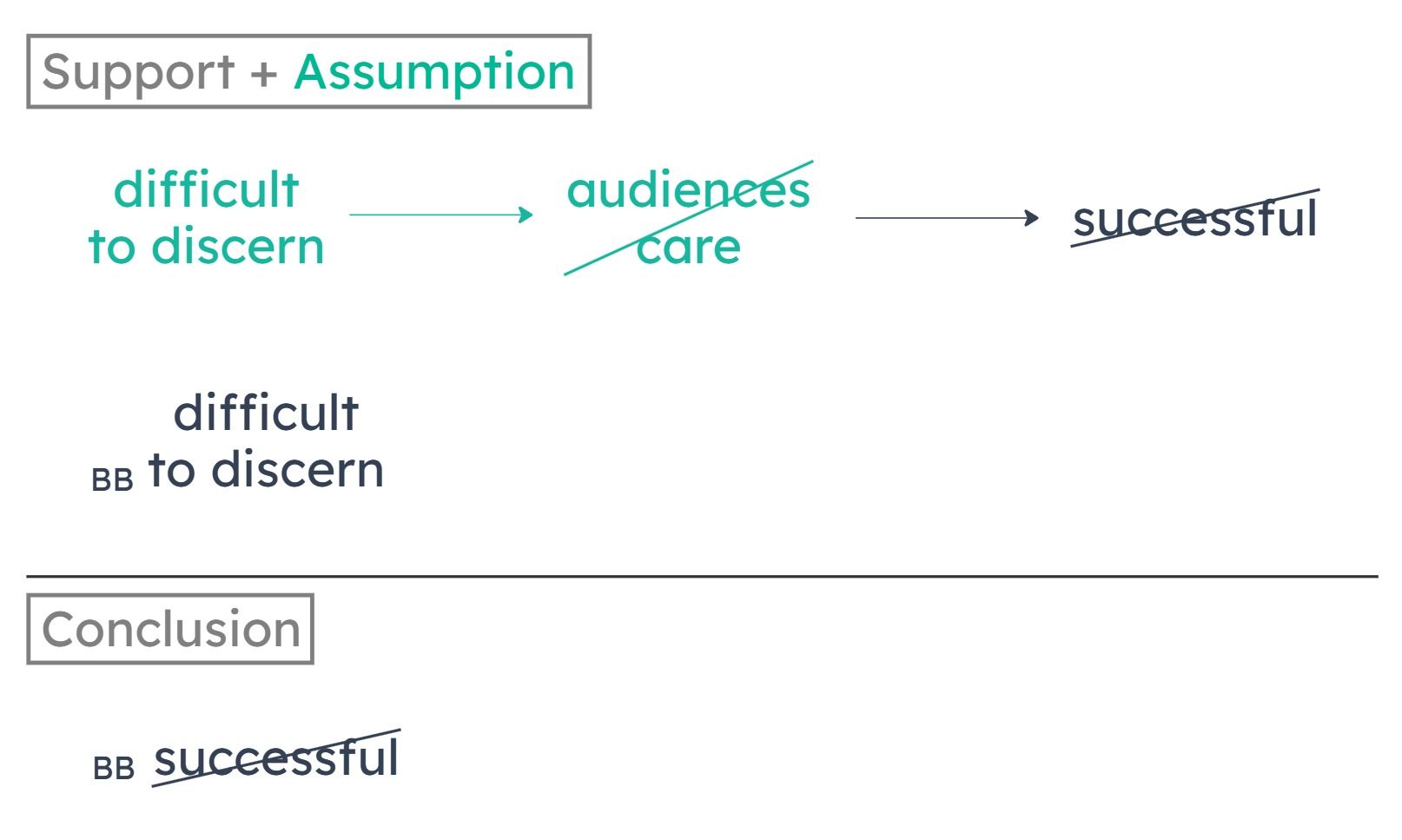LSAT 141 – Section 2 – Question 10
LSAT 141 - Section 2 - Question 10
September 2014You need a full course to see this video. Enroll now and get started in less than a minute.
Target time: 1:20
This is question data from the 7Sage LSAT Scorer. You can score your LSATs, track your results, and analyze your performance with pretty charts and vital statistics - all with a Free Account ← sign up in less than 10 seconds
| Question QuickView |
Type | Tags | Answer Choices |
Curve | Question Difficulty |
Psg/Game/S Difficulty |
Explanation |
|---|---|---|---|---|---|---|---|
| PT141 S2 Q10 |
+LR
| Sufficient assumption +SA Conditional Reasoning +CondR Link Assumption +LinkA | A
81%
164
B
2%
155
C
13%
154
D
3%
154
E
2%
154
|
143 150 158 |
+Medium | 146.882 +SubsectionMedium |
Summary
The author concludes that Bercht’s plays are not genuinely successful dramas. This is based on the following:
In Brecht’s plays, the audiences and actors find it difficult to discern any of the characters’ personalities.
In order to be a successful drama, audiences must care what happens to at least some of the characters.
In Brecht’s plays, the audiences and actors find it difficult to discern any of the characters’ personalities.
In order to be a successful drama, audiences must care what happens to at least some of the characters.

Missing Connection
We have a premise that tells us what’s required to be a successful drama — audiences must care about at least one character’s personality. So if we can show that for Brecht’s plays, audiences do not care about any of its characters, we can prove that Brecht’s plays are not successful dramas.
The other premise tells us that audiences/actors find it difficult to discern characters’ personalities in Brecht’s plays. If we can show that this difficulty in discerning characters’ personalities implies that audiences won’t care about the characters, that would provide the missing link.
The other premise tells us that audiences/actors find it difficult to discern characters’ personalities in Brecht’s plays. If we can show that this difficulty in discerning characters’ personalities implies that audiences won’t care about the characters, that would provide the missing link.
A
An audience that cannot readily discern a character’s personality will not take any interest in that character.
In connection with the premises, (A) establishes that audiences don’t take any interest in the characters in Brecht’s plays. This implies that they won’t care about what happens to those characters, which in turn allows us to conclude that Brecht’s plays are not successful dramas.

B
A character’s personality is determined primarily by the motives and beliefs of that character.
The issue is whether audience’s difficulty in discerning the characters’ personalities implies an audience doesn’t care about the characters. What determines the characters’ personality is irrelevant.
C
The extent to which a play succeeds as a drama is directly proportional to the extent to which the play’s audiences care about its characters.
We already have as a premise the idea that succeeding as a drama requires that the audience cares about at least some of the plays’ characters. What’s missing is that we don’t have a way of establishing that the audience does not care about any characters in Brechts’ plays. (C) doesn’t provide us with that missing piece.
D
If the personalities of a play’s characters are not readily discernible by the actors playing the roles, then those personalities are not readily discernible by the play’s audience.
We already know that the audiences of Brecht’s plays find it difficult to discern any of the characters’ personalities. What matters is the relationship between this and audiences’ caring about the characters.
E
All plays that, unlike Brecht’s plays, have characters with whom audiences empathize succeed as dramas.
(E) tells us that certain plays succeed as dramas. But we’re trying to prove that Brecht’s plays do NOT succeed as dramas.
Take PrepTest
Review Results
LSAT PrepTest 141 Explanations
Section 1 - Reading Comprehension
- Passage 1 – Passage
- Passage 1 – Questions
- Passage 2 – Passage
- Passage 2 – Questions
- Passage 3 – Passage
- Passage 3 – Questions
- Passage 4 – Passage
- Passage 4 – Questions
Section 2 - Logical Reasoning
- Question 01
- Question 02
- Question 03
- Question 04
- Question 05
- Question 06
- Question 07
- Question 08
- Question 09
- Question 10
- Question 11
- Question 12
- Question 13
- Question 14
- Question 15
- Question 16
- Question 17
- Question 18
- Question 19
- Question 20
- Question 21
- Question 22
- Question 23
- Question 24
- Question 25
Section 3 - Reading Comprehension
- Passage 1 – Passage
- Passage 1 – Questions
- Passage 2 – Passage
- Passage 2 – Questions
- Passage 3 – Passage
- Passage 3 – Questions
- Passage 4 – Passage
- Passage 4 – Questions
Section 4 - Logical Reasoning
- Question 01
- Question 02
- Question 03
- Question 04
- Question 05
- Question 06
- Question 07
- Question 08
- Question 09
- Question 10
- Question 11
- Question 12
- Question 13
- Question 14
- Question 15
- Question 16
- Question 17
- Question 18
- Question 19
- Question 20
- Question 21
- Question 22
- Question 23
- Question 24
- Question 25
- Question 26
Leave a Reply
You must be logged in to post a comment. You can get a free account here.